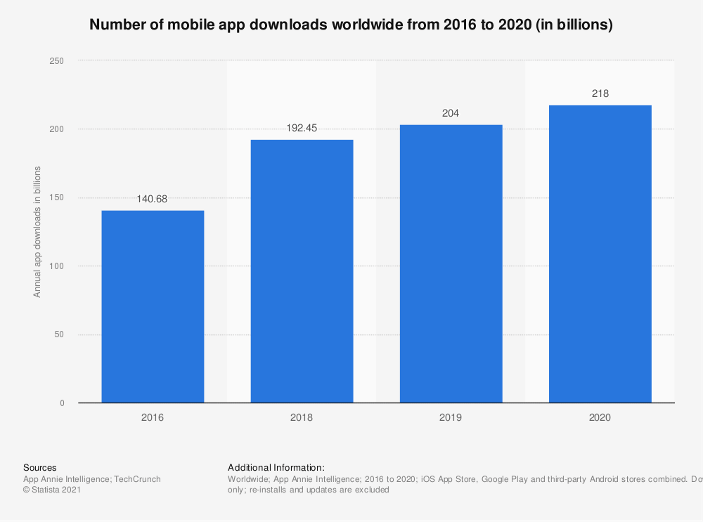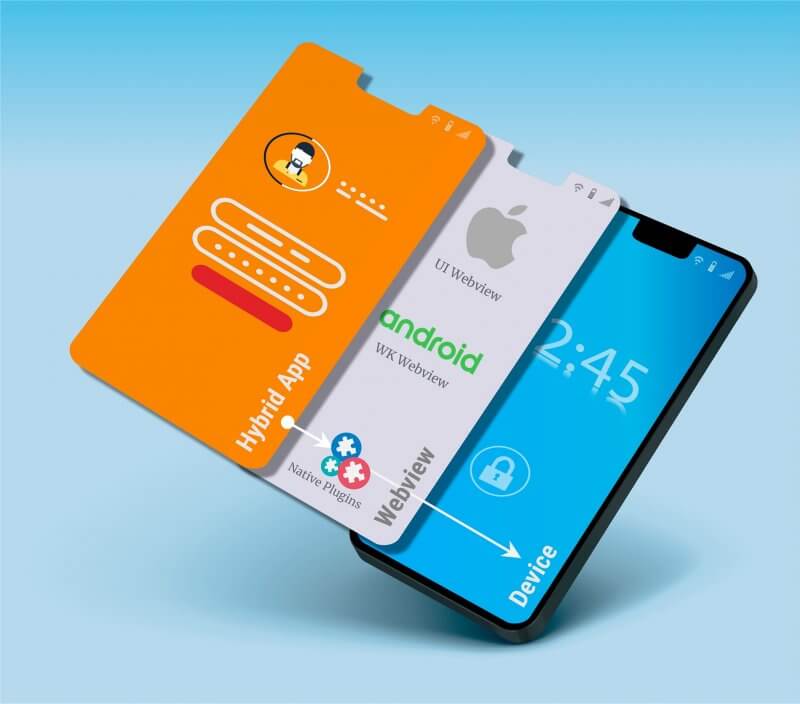With so many apps being developed each year, There are still a lot of misunderstandings about mobile app development. it’s critical to know the difference between Native mobile app, Hybrid Mobile app and Webview mobile apps.
Since 2016, the amount of mobile app downloads has steadily climbed, topping 200 billion in 2019. In the most recent year for which data is available, consumers downloaded 218 billion mobile apps to their connected devices, up from 140.7 billion in 2016.

Many firms considering mobile apps face a common dilemma as we move towards a mobile-first world: which should we choose? Is it better to create a native, mobile web, or hybrid app?
This decision can make or break the effectiveness of your mobile strategy, depending on your business objectives and overall product goals.
In this Article, we’ll go through the differences between Native, Webview, and Hybrid Apps, as well as the pros and cons of each, so you can figure out which approach is best for your mobile app concept.
You may also be interested in The best programming language / framework for Mobile App Development
What are Native Mobile Apps?
The Most Frequent Type of App is Native Mobile Apps. They’re designed for certain platforms and written in platforms-friendly languages. For native iOS apps, for example, Swift and Objective-C, and Java or Kotlin for native Android apps. Native apps are also developed mostly utilizing the operating system’s own Integrated Development Environment (IDE).
Apple and Google each provide their own set of development tools, UI kits, and SDKs to app developers. Lots of businesses will prefer native mobile app development because of the vast advantages it provides over other types of mobile apps.
Pros
- Native apps perform the best compared to the other two development options.
- In terms of user input and output, native apps are more engaging, intuitive, and perform more smoothly.
- Native development gives programmers access to the entire feature set of the operating system they’ve chosen.
- An operating system must approve a native app in order to ensure quality, security, and device compatibility.
Cons
- Native apps are more expensive to produce in the beginning than online or hybrid apps because they use difficult programming languages that demand the participation of expert programmers.
- Native apps aren’t the best solution for simple applications.
What are Webview Apps?
Webview Apps are websites that include interactivity similar to that of a smartphone app. Web apps are created using HTML5 and/or Javascript and may be viewed in a variety of browsers, including Safari and Chrome. Building a web app can be the most cost-effective alternative if your firm is on a tight budget and doesn’t require complicated functionality or access to operating system tools.
If you want to provide mobile-friendly content to a large number of people, a web app might be the way to go. Web apps are a low-cost approach to getting your product into the hands of a large number of people.
Pros
- Webview apps are relatively easy to maintain since they share the same code base across many mobile devices.
- Webview app updates do not require the usage of an app store, therefore the user does not have to manage updates manually. When a user starts a web app, the most recent version is always loaded.
Cons
- When it comes to using device features and technology, webview apps have a considerably restricted scope.
- A webview app requires the use of a browser. To use a web app, users must navigate through more steps, such as looking for the page or putting in a URL. In any case, putting in extra effort makes the user experience more difficult.
- Webview apps interact with different web browsers, making it more difficult to collect usage patterns and performance indicators for creating a product roadmap.
- In comparison to native apps, web apps are less engaging and intuitive.
What are Hybrid Mobile Apps?
Hybrid apps are cross-platform and act similarly to native apps. A hybrid app is a cross between a native mobile app and a web application. Although it can be installed on a device like a native app, this type of app is essentially a web app. These apps run in a webview and are constructed with HTML, CSS, or JavaScript.
Pros
- Hybrid app development is essentially a web app with native functionality added on top of it. When you use a wrapper to act as a bridge across platforms, you can include native features.
- Hybrid apps, unlike web apps, do not require the use of a web browser.
- Hybrid apps have access to the internal APIs and hardware of a device.
- In most hybrid apps, just one codebase is required.
Cons
- You must rely on a third-party platform to deploy the app’s wrapper while developing a hybrid app
- The more customization the app demands, the less likely it is to be developed as a hybrid app, which costs more money than native app development.
Between Native VS Hybrid VS Webview: Which one is best?
Your business objectives should guide your decision on whether to design a web, native, or hybrid app. Before you start developing, you should keep in mind the following factors:
- How quickly do you require the app?
- The level of user experience that you want your app to provide
- The number of features you’ll need for your app to function.
As a rule of thumb, every approach you use should be responsive, swift, and dependable. As users generally expect more from mobile experiences, it’s vital to remain on top of changing user demands. As you develop mobile apps, keep the following in mind:
- Your API infrastructure should be able to access your content and services with confidence and ease.
- A mobile app should not be a carbon copy of your website; rather, it should be a natural extension of your brand.
- Always be aware of your users’ expectations and actions, and make adjustments as market conditions change.
Final thoughts
To make the most informed decision, you must first understand the distinctions between each option. Native, mobile web and hybrid apps all offer advantages and disadvantages, and your final decision will be based almost entirely on your startup’s requirements.
After you’ve weighed your options, it’s critical to engage with app developers that can bring your concept to life quickly and affordably. Outsourcing your app development is an excellent approach to getting a feel for your project without having to hire full-time employees.
Working with a skilled outsourcing development team can help your mobile app development project feel more normal, rather than like a massive leap into unknown terrain. We can assist you in selecting the most suitable app for your idea and link you with our network of top app developers.
If you enjoyed this content, we’ll be very grateful if you’d help spread by sharing it to your friends using the share button. you can also get our latest updates by following us on facebook, twitter, linkedin and instagram. You can also subscribe to our youtube channel for more tutorials, programming tips and tricks and Tech review.











